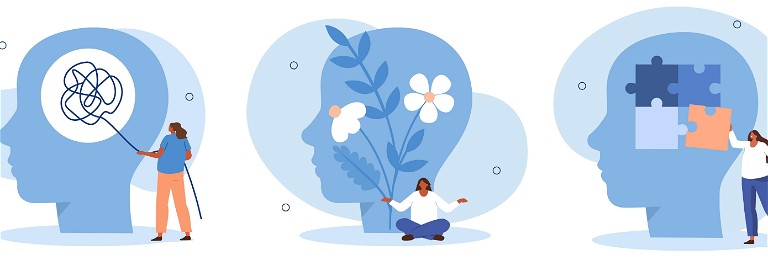Feature
Focusing on World Mental Health Day
Betsy Goodfellow from Pharmafocus looks at why mental health is so important during the colder, darker months
With World Mental Health Day being marked on 10 October each year, it is worth considering the importance of taking care of our mental health, especially as autumn and winter approach. The shorter days and darker nights, combined with colder weather, can cause many people to experience feelings of sadness and depression. It is thought that three in every 100 people in the UK experience significant winter depressions, but seasonal affective disorder (SAD) affects even more people with varying degrees of severity. 1
The theme for this year’s World Mental Health Day is ‘mental health is a universal human right’.2 Previous themes have included: ‘Make mental health and well-being for all a global priority’, ‘Mental healthcare for all: let’s make it a reality’ and ‘Move for mental health: let’s invest’.2 It is evident from these themes that the main priority of this campaign is to emphasise the importance of mental healthcare and to ensure that it is accessible to all.
Announcing this year’s theme, the World Federation for Mental Health (WFMH) stated: ‘Mental health must be squarely placed in a human rights framework to re-cast the aspiration for sound mental health as a fundamental human right. Ensuring access to mental health services must be an obligation and responsibility of state and global organisations which can no longer be ignored. Access to better living conditions, security, food, shelter and housing are all necessary for people's mental health. Mental health is a universal right to all citizens of the world and consistent with the 1948 founding principles of WFMH.’3

The WFMH focuses on emphasising the importance of removing the stigma around mental health in order to allow everyone, worldwide, to access the mental health services they need. Many mental health charities, including Mind and WFMH, see the need for action on a national level, highlighting the importance of governments ensuring that healthcare services offer adequate mental healthcare for all. As part of this, Mind has started a petition to compel the government to reform the Mental Health Act, which has not been updated for forty years, stating: ‘Awareness is just the start. Now it’s time to act’.4 It is also very appropriate that World Mental
Health Day falls in October, as during the autumn and winter months, many people’s mental health declines as they experience SAD. Symptoms of SAD include: a persistent low mood; a loss of interest in normal activities; irritability, feelings of despair, guilt or worthlessness; feeling lethargic and tired during the day; sleeping longer than normal and finding it difficult to get up; craving carbohydrates and gaining weight; difficulty concentrating; and a decreased sex drive.5
The causes of SAD are currently unknown, however it is thought that it is linked to reduced exposure to sunlight in the autumn and winter months, as this can stop the hypothalamus, part of the limbic system of the brain, from working properly, which in turn affects the production of melatonin and serotonin as well as impacting the body’s internal clock or circadian rhythm.55 If a patient is struggling with SAD symptoms, they can contact their GP to discuss the various treatments for SAD, which include lifestyle measures, talking therapies such as cognitive behavioural therapy (CBT), light therapy or antidepressants such as selective serotonin reuptake inhibitors (SSRIs). 5
While it is extremely important to look after our mental health all year round, this is especially relevant during the colder, darker autumn and winter months, when many people begin to struggle with symptoms of SAD. It is also worth noting that although most people experience SAD in the autumn and winter, some also experience these symptoms in spring and summer, although this is rare.6 .
The Seasonal Affective Disorder Association (SADA) recommends the following 12 steps to help patients overcome their own SAD:6
- Try not to isolate yourself
- Attend social gatherings when possible
- Sit in the sunlight every day
- Eat healthy meals and maintain a regular diet
- Exercise to help boost your mood
- Ensure you get a good night’s sleep and stick to the same routine for going to sleep at night and waking up in the morning
- Take any medicine that has been prescribed to you
- Practice mindfulness and breathing exercises
- Ask for help if you need to
- Spending time with a pet can improve your mood and decrease stress and anxiety
- Join a group that focuses on helping others or working with animals
- Spend time outdoors appreciating nature.6
As various mental health services have closed recently, including England’s only antidepressant withdrawal helpline, it is more important than ever to recognise the importance of maintaining good mental health, as well as good physical health, as autumn and winter approach.7 With that in mind, the NHS has seven tips for improving our mental health: 8
1. Try not to dwell on negative thoughts
2. Be in the present
3. Get enough sleep
4. Connect with others
5. Make healthy lifestyle choices
6. Do something for yourself
7. Write a letter to your future self.8
While mental health is important throughout the year, it is especially relevant that World Mental Health Day falls in October, when many people are beginning to experience symptoms of SAD.
While both the NHS and SADA offer useful tips and advice for looking after our mental health generally and avoiding SAD specifically, it is important to note that there is always help available. Even after World Mental Health Day has been and gone, it remains important to take the time to look after our own mental health and that of others.
References
- Visit: rcpsych.ac.uk/mental-health/mentalillnesses-and-mental-health-problems/seasonal-affective-disorder-(sad)
- Visit: who.int/campaigns/world-mentalhealth-day
- Visit: wfmh.global/news/2023.23-03-29_announcement
- Visit: mind.org.uk/get-involved/worldmental-health-day/
- Visit: nhs.uk/mental-health/conditions/seasonal-affective-disorder-sad/overview/
- Visit: sada.org.uk/
- Visit: bbc.co.uk/news/health-66606405
- Visit: nhs.uk/every-mind-matters/mentalwellbeing-tips/top-tips-to-improve-yourmental-wellbeing/